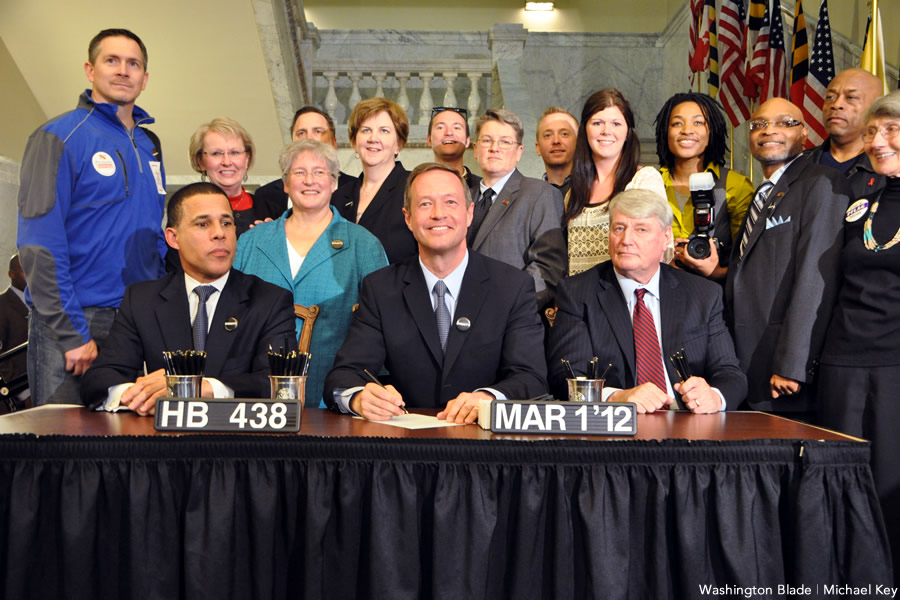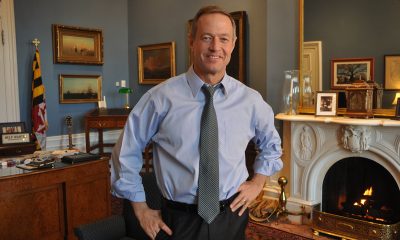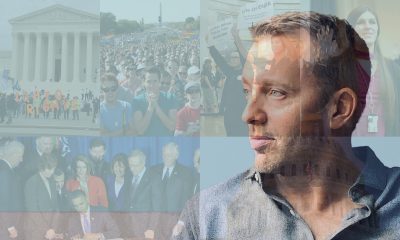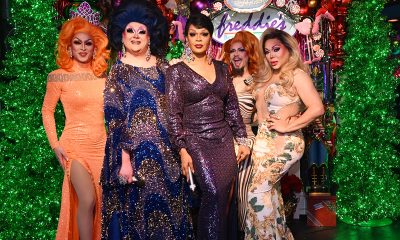Arts & Entertainment
Anatomy of a victory
Behind the scenes of the Maryland marriage battle
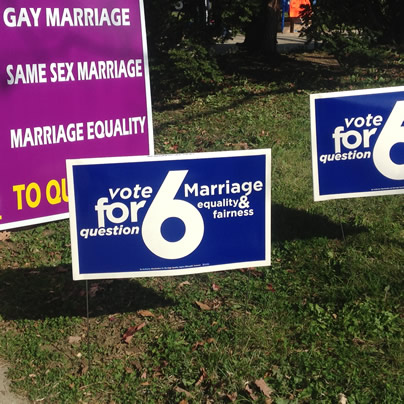
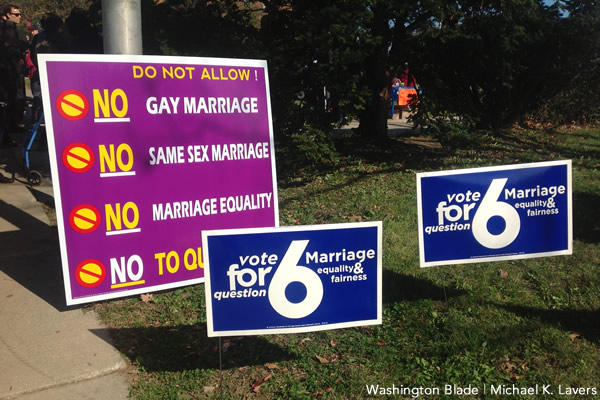
Question 6 supporters and opponents placed signs outside Northwood Elementary School in Baltimore on Nov. 6. (Washington Blade photo by Michael K. Lavers)
Edgewater, Md., residents Adri Eathorne and Kim-May Hinken arrived at Anne Arundel Medical Center in Annapolis to visit their friend, Scott Bowling, shortly before the polls closed at 8 p.m. on Election Day. The three of them nervously awaited the results of the referendum on Maryland’s same-sex marriage law as the slowly began to trickle in.
More than four hours later, they learned Question 6 had narrowly passed.
“We closed his hospital room door,” Eathorne, who has been with Hinken nine years, says. “We closed his hospital room door so we could [yell] ‘Yeah!’ and high-five each other and hug and kiss and cry.”
The passage of Question 6 by a 52-48 percent margin on Nov. 6 capped off an anxious night of waiting for the hundreds of people and dozens of reporters who had gathered at the Baltimore Soundstage.
One of Gov. Martin O’Malley’s staffers wrote on a napkin during lunch on Election Day that the referendum would pass with 53 percent support. Congressman Elijah Cummings made the same prediction during an interview with the Washington Blade earlier in the day outside a Northeast Baltimore polling place at which the governor, Baltimore Mayor Stephanie Rawlings-Blake and Brendon Ayanbadejo of the Baltimore Ravens greeted voters.
“I had a pretty good sense as we were heading into Election Day that it was going to hold,” O’Malley said in a Blade interview this week. “I had a pretty good sense in the course of those last 10 days that it was on a good positive trajectory.”
Josh Levin, campaign manager for Marylanders for Marriage Equality, was backstage with the governor, Rawlings-Blake and several other elected officials watching the results come in. President Obama had already won re-election by the time Politico reported shortly before midnight that Question 6 had passed with 84 percent of precincts reporting.
Levin and others remained hesitant to declare victory because Montgomery County had yet to report election results. (Question 6 passed in the county by a 65-35 percent margin.)
“Once we figured that out then I started breathing a little more deeply,” O’Malley says. “Then when the Montgomery County numbers came in and we were up to 51 [percent,] the night seemed to be coming into perspective. We were very reluctant to claim a victory of course until we had enough of the numbers in.”
Levin last week, while cleaning out Marylanders for Marriage Equality’s Baltimore office, says Question 6 was leading throughout the night.
“We watched it grow to 45,000 votes or so,” he says. “It shrank at one point to about 12,000. But right around midnight we felt like we had a pretty good sense of where things were. And so I went back to talk through what still could happen, what’s still out, where do we think that’s coming from and made the decision to go up on stage and declare victory from there.”
“There was confidence once the results started to come in,” says gay state Sen. Rich Madaleno (D-Montgomery County.) “There was confidence all night long, it’s just a matter of when do you say it. And because we had never won before, there’s no desire to jinx yourself. I think you’re more cautious than you would have ever been.”
The Washington Post projected Question 6 had passed just as O’Malley, Rawlings-Blake, Levin and others took to the stage to declare victory. Those gathered inside the Baltimore Soundstage became euphoric when lesbian state Del. Maggie McIntosh (D-Baltimore City) announced the referendum had passed. People began to cry. Gay state Dels. Luke Clippinger (D-Baltimore City) and Heather Mizeur (D-Montgomery County) were among those who started dancing once the governor and other dignitaries stepped away from the podium.
O’Malley instrumental in fundraising
Election Day capped off a long and often tumultuous effort for Maryland’s same-sex marriage advocates that began in 1997 when three state lawmakers introduced the first bill that would have allowed nuptials for gays and lesbians.
Equality Maryland, which nearly closed in June 2011, and the American Civil Liberties Union in 2004 filed a lawsuit on behalf of Lisa Polyak and Gita Deane and eight other same-sex couples and a gay widow who sought the right to marry in the state. The Maryland Court of Appeals in 2007 ultimately upheld the constitutionality of the state’s ban on marriage for gays and lesbians.
State lawmakers in 2011 narrowly defeated a same-sex marriage bill, but legislators approved it in February. O’Malley signed the law on March 1.
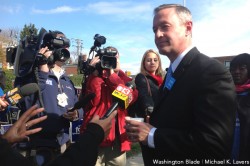
Governor Martin O’Malley speaks to reporters outside Northwood Elementary School in Baltimore on Nov. 6. (Washington Blade photo by Michael K. Lavers)
The governor soon emerged as the law’s most prominent supporter, especially after the Maryland Marriage Alliance collected more than 160,000 signatures to force a referendum on the issue. Marylanders for Marriage Equality turned to O’Malley, among others, in early August to help bolster their then-anemic fundraising efforts.
“We found ourselves in a situation where polling looked good, we felt good about what we were building, but we simply weren’t bringing in money at the rate that we needed to,” Levin says. “We as a campaign and with our board members we sort of rang the bell a little bit and talked to the governor, got Maggie McIntosh more involved. The ACLU redoubled their efforts. And I think brought to bear all the efforts that helped us [reach] the financial goals that we needed to.”
Levin said in June his group could effectively defend the law with between $5-$7 million, in spite of some observers who said Marylanders for Marriage Equality needed to raise up to $12 million.
O’Malley headlined a star-studded fundraiser gay former Republican National Committee Chair Ken Mehlman co-hosted at a New York City hotel in September that raised more than $100,000 for the pro-Question 6 group. The governor also appeared at an Oct. 2 fundraiser with D.C. Mayor Vincent Gray and House Minority Whip Steny Hoyer (D-Md.) at gay Democratic lobbyist Steve Elmendorf’s Logan Circle home. Former National Football League Commissioner Paul Tagliabue and his wife Chan announced a $100,000 donation to Marylanders for Marriage Equality during the fundraiser that Chip DiPaula, Jr., former Gov. Bob Ehrlich, Jr.’s gay chief-of-staff, attended alongside Mizeur and others.
The Human Rights Campaign contributed more than $1.5 million in cash and in-kind contributions to the pro-Question 6 campaign. Freedom to Marry, which initially declined to join the coalition defending the state’s same-sex marriage law, said it invested more than $200,000 into the campaign. This figure includes the $70,000 it gave that helped Marylanders for Maryland Equality air their radio ad highlighting President Obama’s support of marriage rights for same-sex couples in the days leading up to Election Day.
“HRC provided so much of the backbone to this whole effort,” Madaleno says. “They were absolutely critical.”
Marylanders for Marriage Equality ultimately raised $6 million — they consistently outraised the Maryland Marriage Alliance throughout the Question 6 campaign. The ACLU and other organized labor groups contributed more than $1 million to Marylanders for Marriage Equality.
New York City Mayor Michael Bloomberg and Republican hedge fund manager Paul Singer both donated $250,000 to the pro-Question 6 campaign. The bulk of the 11,000 people who contributed to Marylanders for Marriage Equality, however, live in Maryland.
“We proved from going to the state that nobody thought could win to being the second-widest margin after Maine among the four is pretty cool,” Levin says. “And I want to really say the team that was here through the legislative campaign that figured out, that believed in doing Maryland when nobody else did — the leadership of folks like Sultan [Shakir] and Kevin [Nix], Rich Madaleno and Luke Clippinger and all the others.”
One of the proudest moments of the campaign for Levin came when Marylanders for Marriage Equality was able to counter a Maryland Marriage Alliance television ad that claimed Question 6 would force schools to teach same-sex marriage with their own ad eight hours later that featured Baltimore County teacher Pamela Gaddy. Levin showed it to McIntosh, HRC President Chad Griffin, former O’Malley adviser Joe Bryce and his wife Kristen and a handful of others shortly after he arrived at a campaign fundraiser at DiPaula’s home before he put it on the air on Oct. 26.
“We were ready and able to do it that fast, versus the stories that so many other folks who worked in California [on the campaign against Proposition 8] told just having to figure it out there,” Levin says. “The lessons they learned they gave us and we applied. And we took a Maryland angle on it, putting up an African-American, Baltimore-area schoolteacher to just go, ‘That’s not true, you know.’ When we looked at it a week later, their argument wasn’t resonating. People just weren’t buying it, according to our research.”
Obama, NAACP endorsements key
O’Malley, Levin and Mizeur all noted Obama’s public support of marriage rights for gays and lesbians and his endorsement of the same-sex marriage law garnered additional support among black Marylanders.
In addition to the radio ad featuring the president, Marylanders for Marriage Equality also sent a mailing that contained his and first lady Michelle Obama’s statements in support of marriage rights for same-sex couples to 200,000 African-American households in the state. (Baltimore Black Pride co-chair Meredith Moise was handing out these fliers on Election Day as she spoke with voters outside a polling place at a Northeast Baltimore elementary school.)
“It was important that we echoed their support,” Levin says.
The NAACP’s support of Question 6 and particularly television ads that featured Julian Bond, the civil rights organization’s chair emeritus, and Revs. Delman Coates of Mount Ennon Baptist Church in Clinton and Donté Hickman of Southern Baptist Church in Baltimore appear to have resonated with voters in the predominantly black Charm City.
Question 6 passed by a 57-43 percent margin in Baltimore City. It lost by slightly more than 4,300 votes in Prince George’s County.
A Public Policy Polling survey in May found 55 percent of black Marylanders would vote for the law, compared to 36 percent who said they would oppose it. A Hart Research Associates survey conducted in late July found 44 percent of African-American voters would support Question 6, compared to 45 percent who said they would vote against it. A Gonzales Research poll in September noted 44 percent of black Marylanders backed marriage rights for same-sex couples, compared to 52 percent who oppose nuptials for gays and lesbians. An Associated Press exit poll indicates roughly half of black Maryland voters voted against Question 6.
Maryland Marriage Alliance Chair Derek McCoy, Bishop Harry Jackson, Jr., of Hope Christian Church in Beltsville and others who opposed the law repeatedly criticized and even mocked the NAACP, Obama, Coates, Hickman and other prominent black leaders who backed marriage rights for same-sex couples in the state. Some Question 6 opponents resorted to increasingly homophobic rhetoric during appearances at black churches and other public forums in the weeks leading up to Election Day. Pastor Luke Robinson of Quinn Chapel AME Church in Frederick even suggested during a sparsely attended rally against the same-sex marriage law at a city park on Nov. 4 that Superstorm Sandy struck New York City less than three weeks after Bloomberg donated $250,000 to Marylanders for Marriage Equality.
“It pretty clearly was having an effect,” Levin says. “I don’t think the other guys would have been bringing it up as often if it hadn’t been.”
The Maryland State Conference of the NAACP and the organization’s Prince George’s County and Baltimore branches in particular factored prominently in the pro-Question 6 campaign.
Bob Ross, president of the Prince George’s County Branch of the NAACP, organized phone banks and canvassing efforts ahead of Election Day. He also spoke about his gay brother who had lived in the closet for years during a Nov. 5 rally at the University of Maryland in College Park that O’Malley, Hoyer, Madaleno, state Sen. Allan Kittleman (R-Carroll and Howard Counties) and others attended.
“Surely we need to recognize not only the importance of their endorsement, but the amount of work that they did,” Levin says.
Couples busy planning weddings
With all the behind-the-scenes work that led to the passage of Question 6, the only thing that matters to those who plan to take advantage of the law once it officially takes effect on Jan. 1 is the fact they can legally marry the person they love.
“It was kind of like, ‘Oh my God, what are we doing about our wedding plans?’” says ShaDonna Jackson, a Hyattsville, Md., resident who plans to wed her partner of nearly four years, Latisha Smith. “We needed absolute certainty because it’s a serious matter. It’s like, ‘Oh my goodness everything depends on this, so we need to know.’ And now that we know, we are back to our wedding plans.”
Eathorne and Hinken, who chairs the annual Chesapeake Pride Festival, are planning to get married in Annapolis on the first day same-sex couples can legally marry in the state.
“We’ve waited so long for it to be legal in our home state that we really wanted to do it as soon as possible,” Eathorne says (they had a church wedding in 2007). Hinken also spoke in support of the same-sex marriage bill in front of the State House in Annapolis. “We just want to make that statement. And that’s one of the reasons why we want it to be ASAP. We’ve been together for nine years. We don’t need a big full-blown wedding. We had our thing. It is special and we do plan to acknowledge it and celebrate it in some way.”
Madaleno, who once again proposed to his husband Mark on stage at the Baltimore Soundstage after Question 6 passed, plans to have what he describes as their “renewal of vows” once they and their two children return from a family vacation at Walt Disney World in Florida in January. The couple married 11 years ago at their Bethesda church, but Madaleno said having the legal recognition will make it even more official.
“What will be different,” he says, “is we’re getting a license.”
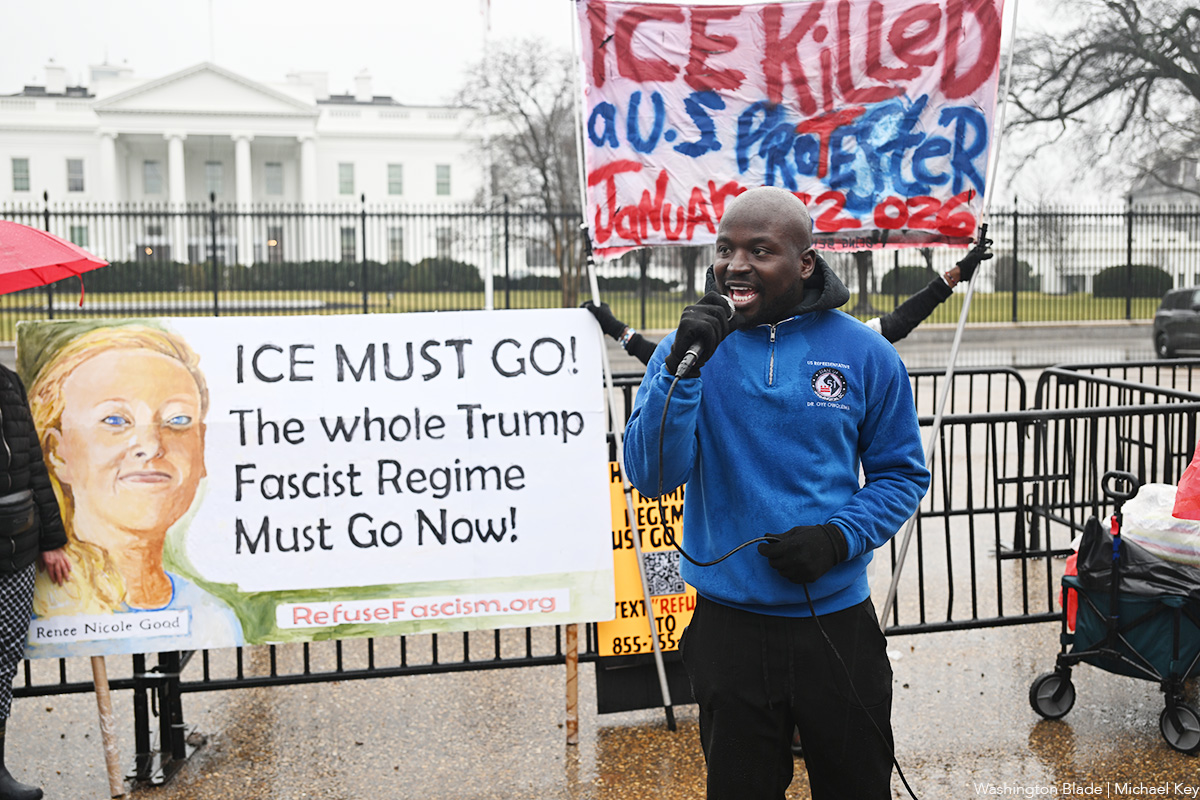
A protest was held outside of the White House on Saturday following the killing of Renee Nicole Good by a U.S. Immigration and Customs Enforcement agent in Minneapolis. Across the Potomac, picketers held signs calling for “Justice for Renee” in Tysons, Va.
“ICE Out For Good” demonstrations were held in cities and towns across the country, according to multiple reports. A march was held yesterday in Washington, D.C., as the Blade reported. Further demonstrations are planned for tomorrow.
(Washington Blade photos by Michael Key)
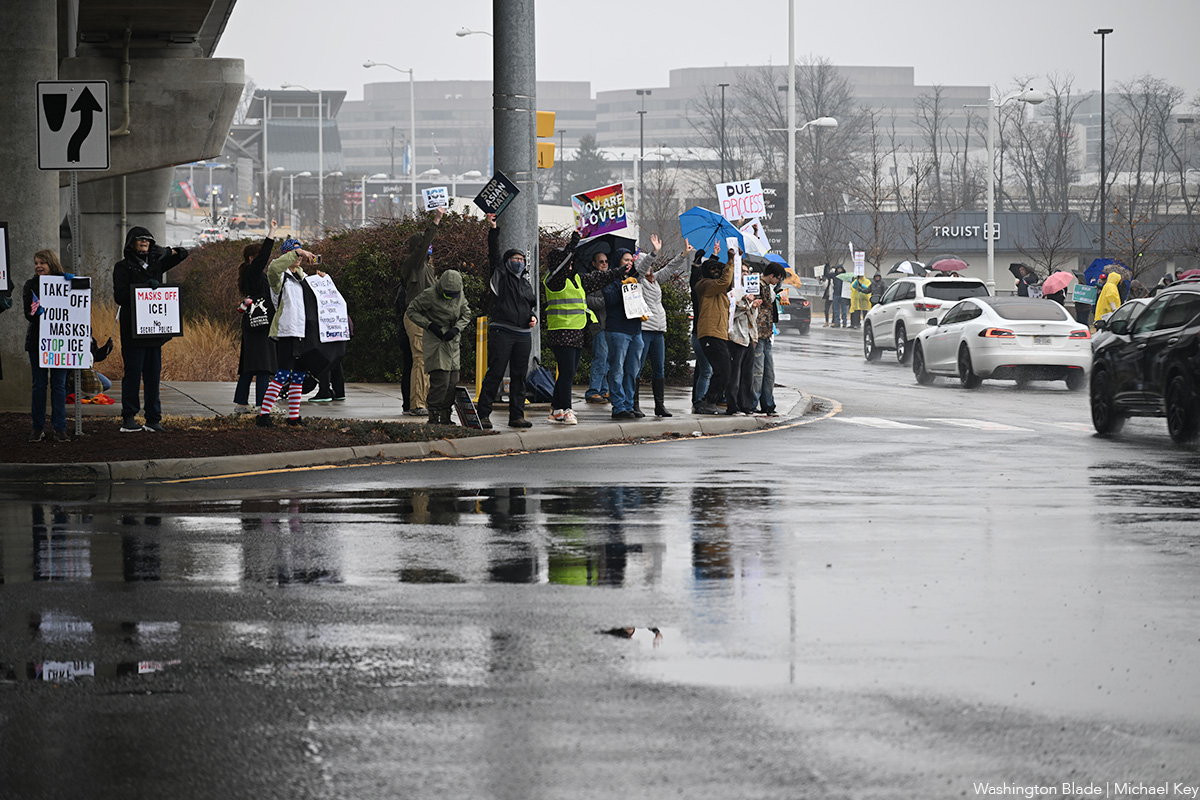
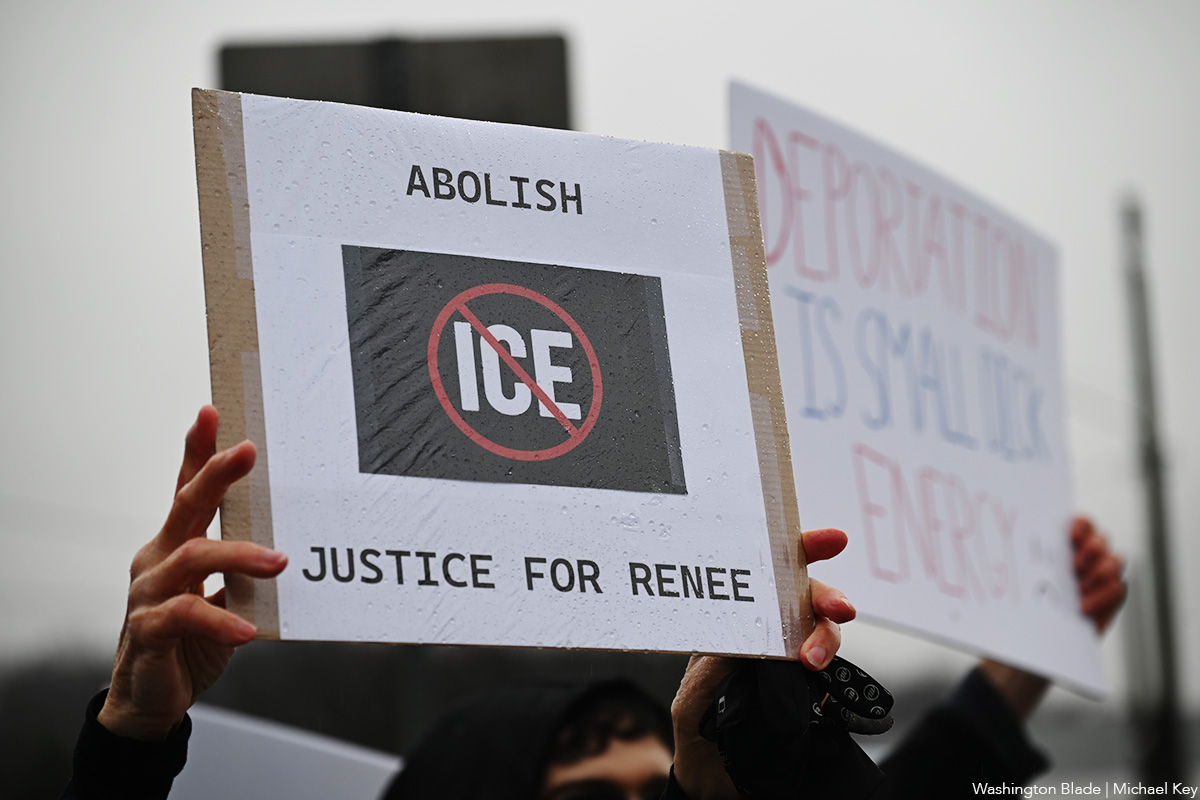
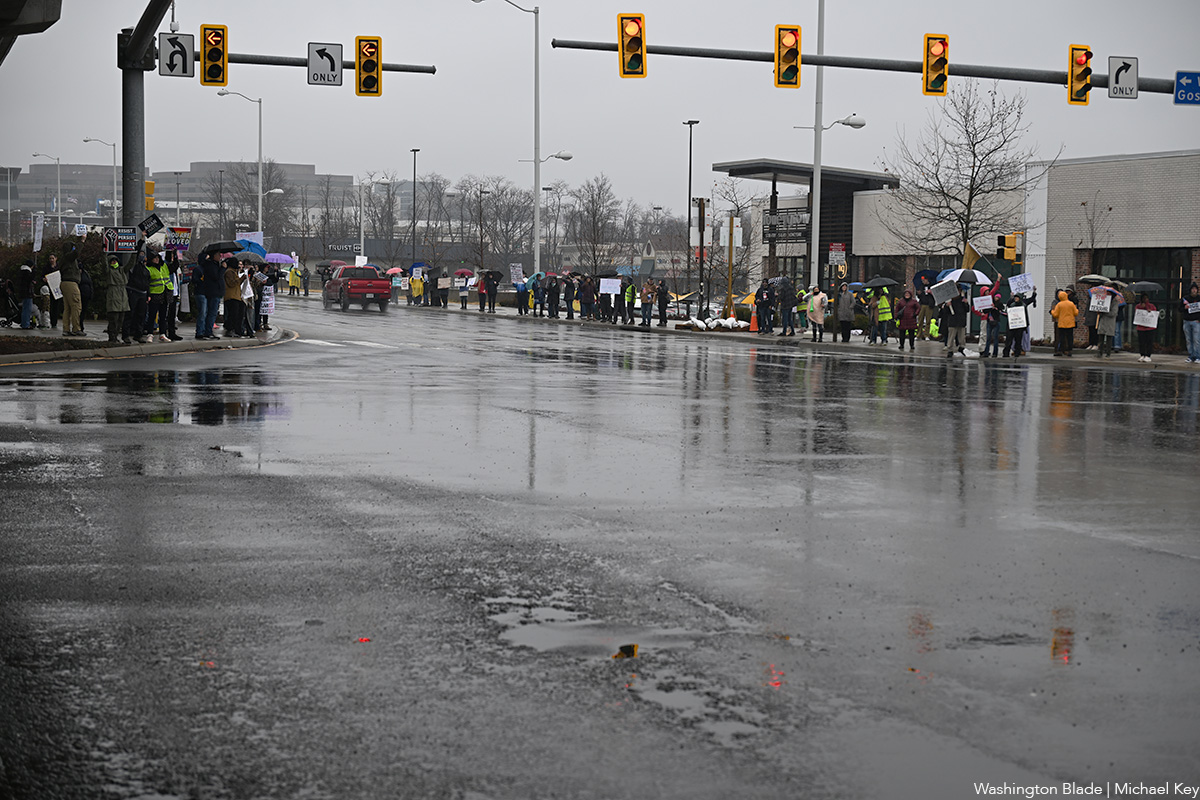
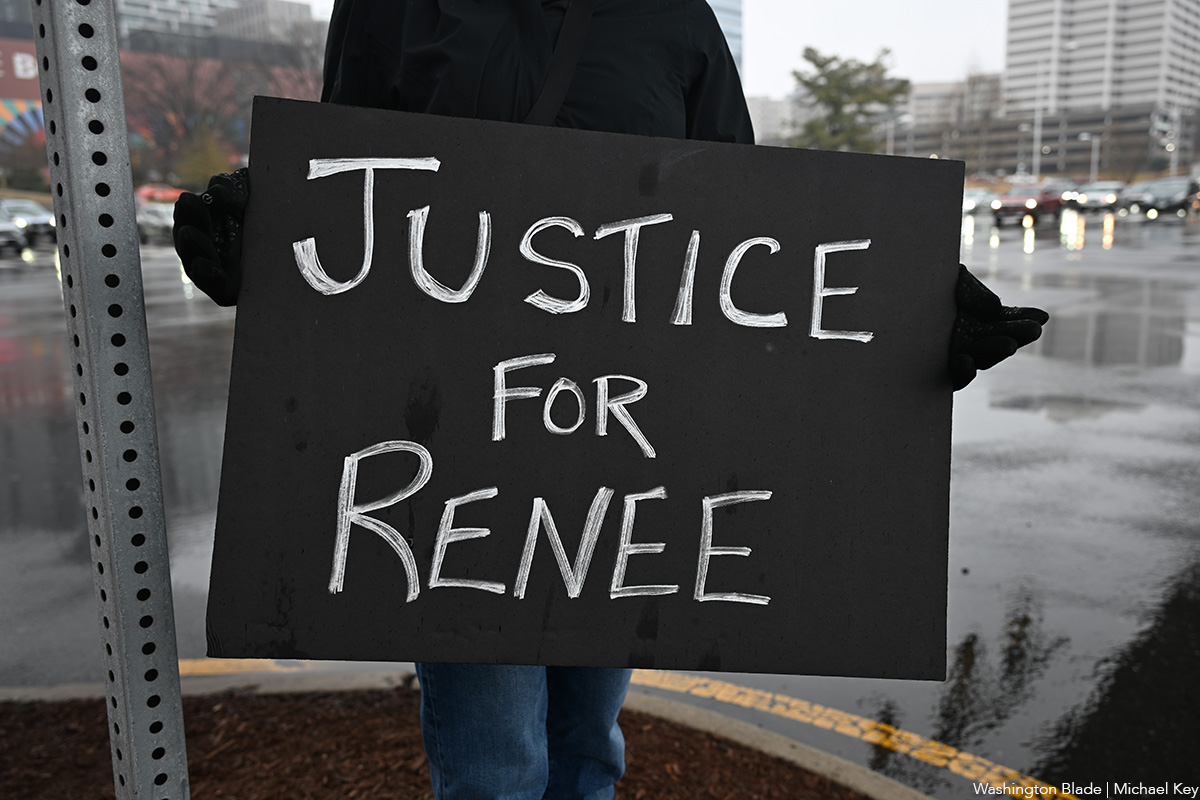
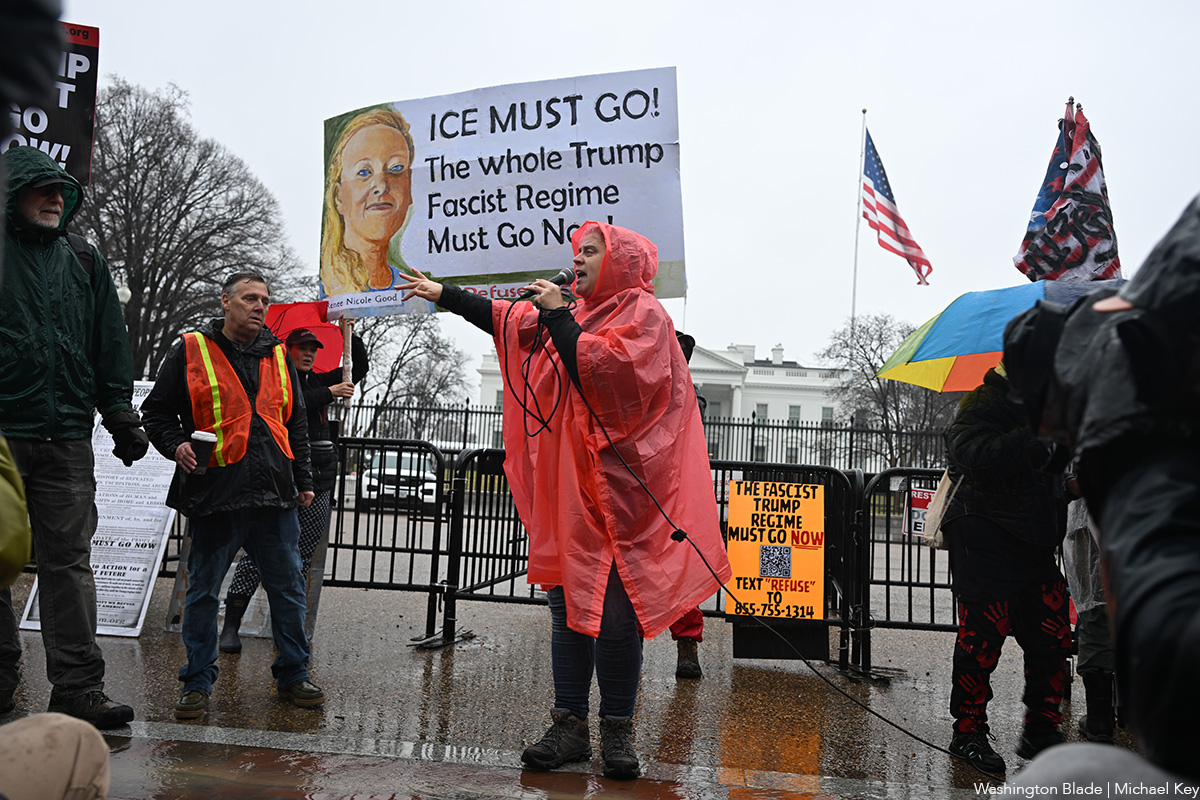
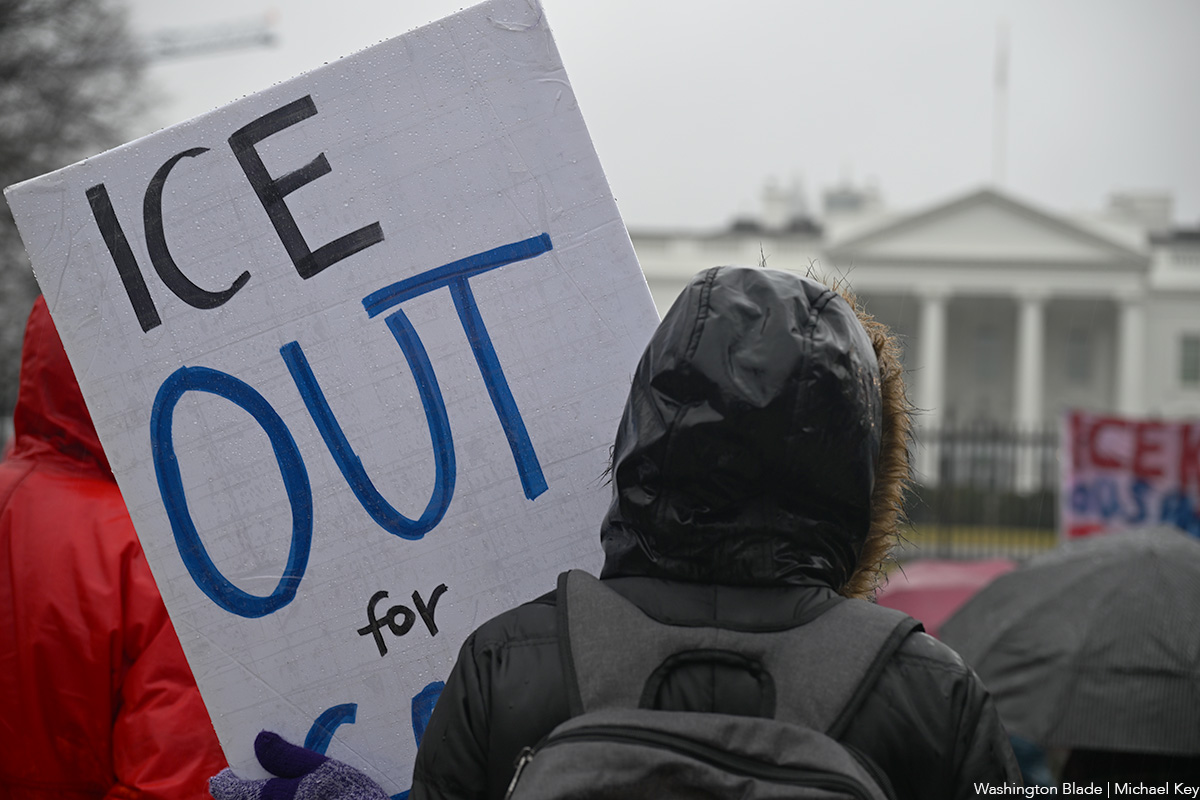
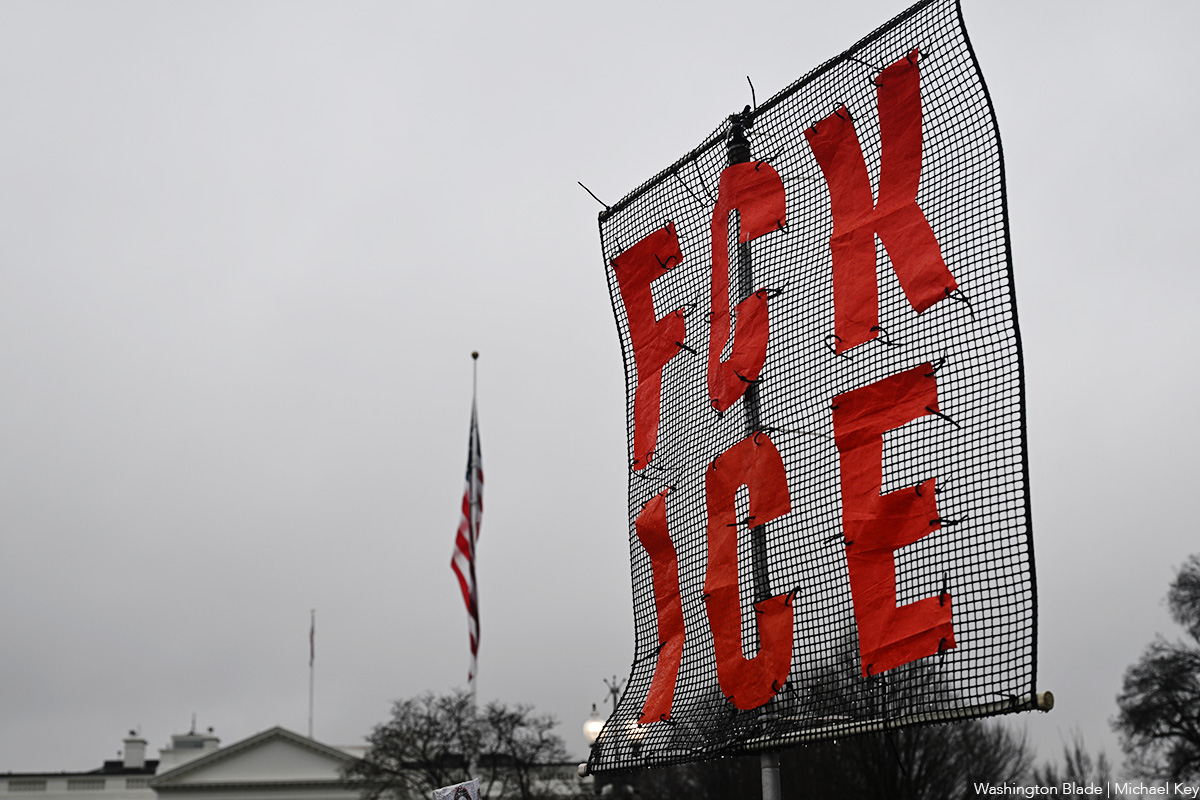
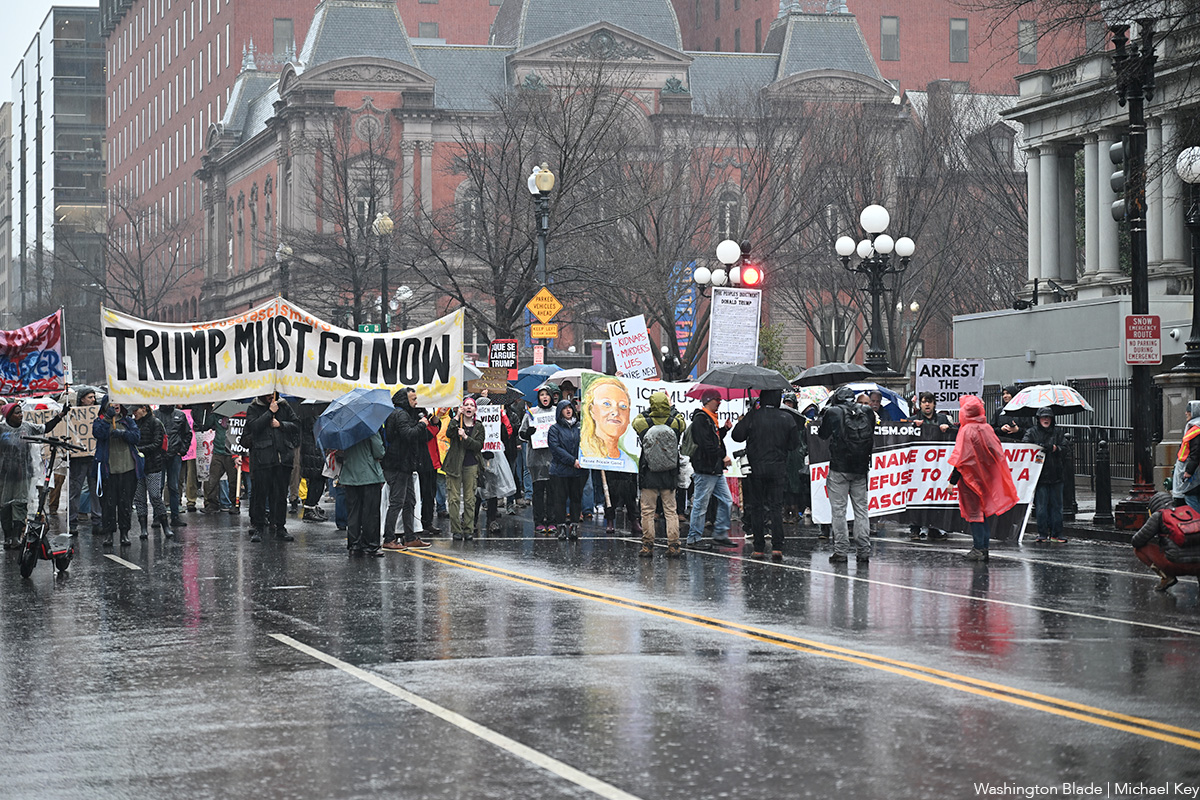

Books
Feminist fiction fans will love ‘Bog Queen’
A wonderful tale of druids, warriors, scheming kings, and a scientist
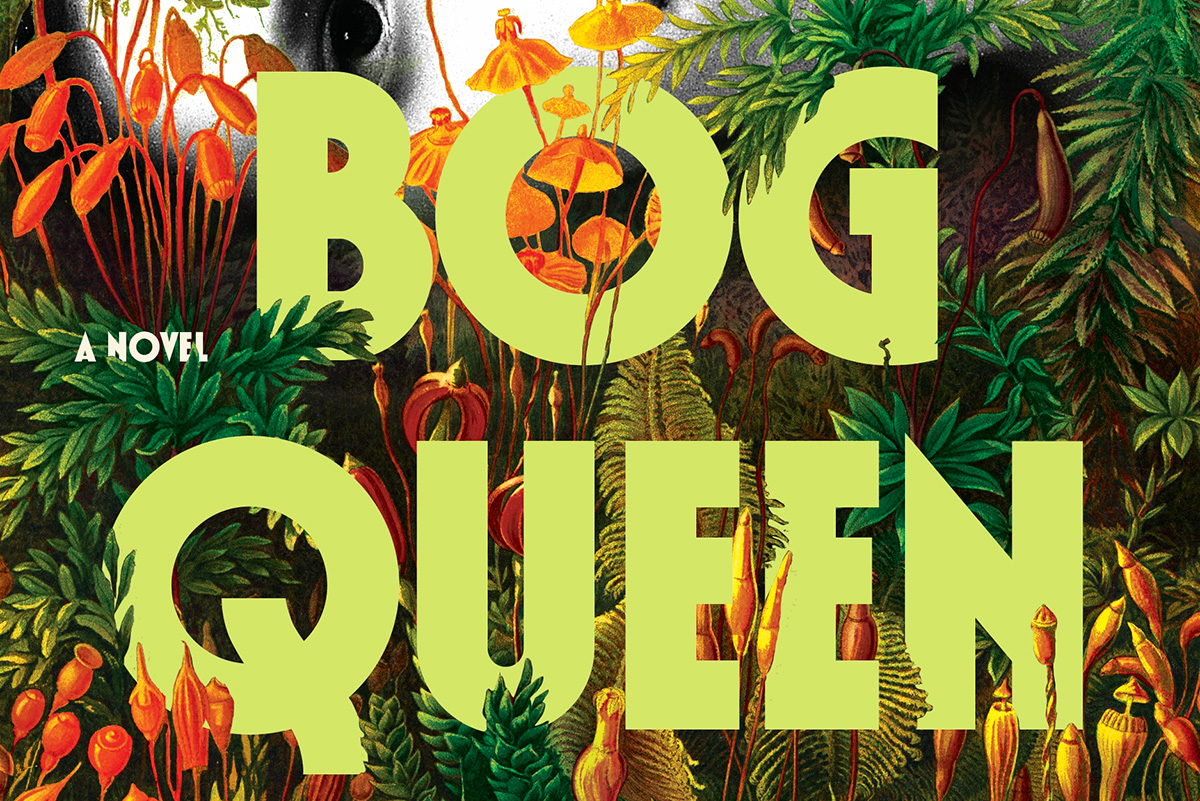
‘Bog Queen’
By Anna North
c.2025, Bloomsbury
$28.99/288 pages
Consider: lost and found.
The first one is miserable – whatever you need or want is gone, maybe for good. The second one can be joyful, a celebration of great relief and a reminder to look in the same spot next time you need that which you first lost. Loss hurts. But as in the new novel, “Bog Queen” by Anna North, discovery isn’t always without pain.

He’d always stuck to the story.
In 1961, or so he claimed, Isabel Navarro argued with her husband, as they had many times. At one point, she stalked out. Done. Gone, but there was always doubt – and now it seemed he’d been lying for decades: when peat cutters discovered the body of a young woman near his home in northwest England, Navarro finally admitted that he’d killed Isabel and dumped her corpse into a bog.
Officials prepared to charge him.
But again, that doubt. The body, as forensic anthropologist Agnes Lundstrom discovered rather quickly, was not that of Isabel. This bog woman had nearly healed wounds and her head showed old skull fractures. Her skin glowed yellow from decaying moss that her body had steeped in. No, the corpse in the bog was not from a half-century ago.
She was roughly 2,000 years old.
But who was the woman from the bog? Knowing more about her would’ve been a nice distraction for Agnes; she’d left America to move to England, left her father and a man she might have loved once, with the hope that her life could be different. She disliked solitude but she felt awkward around people, including the environmental activists, politicians, and others surrounding the discovery of the Iron Age corpse.
Was the woman beloved? Agnes could tell that she’d obviously been well cared-for, and relatively healthy despite the injuries she’d sustained. If there were any artifacts left in the bog, Agnes would have the answers she wanted. If only Isabel’s family, the activists, and authorities could come together and grant her more time.
Fortunately, that’s what you get inside “Bog Queen”: time, spanning from the Iron Age and the story of a young, inexperienced druid who’s hoping to forge ties with a southern kingdom; to 2018, the year in which the modern portion of this book is set.
Yes, you get both.
Yes, you’ll devour them.
Taking parts of a true story, author Anna North spins a wonderful tale of druids, vengeful warriors, scheming kings, and a scientist who’s as much of a genius as she is a nerd. The tale of the two women swings back and forth between chapters and eras, mixed with female strength and twenty-first century concerns. Even better, these perfectly mixed parts are occasionally joined by a third entity that adds a delicious note of darkness, as if whatever happens can be erased in a moment.
Nah, don’t even think about resisting.
If you’re a fan of feminist fiction, science, or novels featuring kings, druids, and Celtic history, don’t wait. “Bog Queen” is your book. Look. You’ll be glad you found it.
Movies
A Shakespearean tragedy comes to life in exquisite ‘Hamnet’
Chloe Zhao’s devastating movie a touchstone for the ages

For every person who adores Shakespeare, there are probably a dozen more who wonder why.
We get it; his plays and poems, composed in a past when the predominant worldview was built around beliefs and ideologies that now feel as antiquated as the blend of poetry and prose in which he wrote them, can easily feel tied to social mores that are in direct opposition to our own, often reflecting the classist, sexist, and racist patriarchal dogma that continues to plague our world today. Why, then, should we still be so enthralled with him?
The answer to that question might be more eloquently expressed by Chloe Zhao’s “Hamnet” – now in wide release and already a winner in this year’s barely begun awards season – than through any explanation we could offer.
Adapted from the novel by Maggie O’Farrell (who co-wrote the screenplay with Zhao), it focuses its narrative on the relationship between Will Shakespeare (Paul Mescal) and his wife Agnes Hathaway (Jessie Buckley), who meet when the future playwright – working to pay off a debt for his abusive father – is still just a tutor helping the children of well-to-do families learn Latin. Enamored from afar at first sight, he woos his way into her life, and, convincing both of their families to approve the match (after she becomes pregnant with their first child), becomes her husband. More children follow – including Hamnet (Jacobi Jupe), a “surprise” twin boy to their second daughter – but, recognizing Will’s passion for writing and his frustration at being unable to follow it, Agnes encourages him to travel to London in order to immerse himself in his ambitions.
As the years go by, Agnes – aided by her mother-in-law (Emily Watson) and guided by the nature-centric pagan wisdom of her own deceased mother – raises the children while her husband, miles away, builds a successful career as the city’s most popular playwright. But when an outbreak of bubonic plague results in the death of 11-year-old Hamnet in Will’s absence, an emotional wedge is driven between them – especially when Agnes receives word that her husband’s latest play, titled “Hamlet,” an interchangeable equivalent to the name of their dead son, is about to debut on the London stage.
There is nothing, save the bare details of circumstance around the Shakespeare family, that can be called factual about the narrative told in “Hamnet.” Records of Shakespeare’s private life are sparse and short on context, largely limited to civic notations of fact – birth, marriage, and death announcements, legal documents, and other general records – that leave plenty of space in which to speculate about the personal nuance such mundane details might imply. What is known is that the Shakespeares lost their son, probably to plague, and that “Hamlet” – a play dominated by expressions of grief and existential musings about life and death – was written over the course of the next five years. Shakespearean scholars have filled in the blanks, and it’s hard to argue with their assumptions about the influence young Hamnet’s tragic death likely had over the creation of his father’s masterwork. What human being would not be haunted by such an event, and how could any artist could avoid channeling its impact into their work, not just for a time but for forever after?
In their screenplay, O’Farrell and Zhao imagine an Agnes Shakespeare (most records refer to her as “Anne” but her father’s will uses the name “Agnes”) who stands apart from the conventions of her town, born of a “wild woman” in the woods and raised in ancient traditions of mysticism and nature magic before being adopted into her well-off family, who presents a worthy match and an intellectual equal for the brilliantly passionate creator responsible for some of Western Civilization’s most enduring tales. They imagine a courtship that would have defied the customs of the time and a relationship that feels almost modern, grounded in a love and mutual respect that’s a far cry from most popular notions of what a 16th-century marriage might look like. More than that, they imagine that the devastating loss of a child – even in a time when the mortality rate for children was high – might create a rift between two parents who can only process their grief alone. And despite the fact that almost none of what O’Farrell and Zhao present to us can be seen, at best, as anything other than informed speculation, it all feels devastatingly true.
That’s the quality that “Hamnet” shares with the ever-popular Will Shakespeare; though it takes us into a past that feels as alien to us as if it took place upon a different planet, it evokes a connection to the simple experience of being human, which cuts through the differences in context. Just as the kings, heroes, and fools of Shakespeare’s plays express and embody the same emotional experiences that shape our own mundane modern lives, the film’s portrayal of these two real-life people torn apart by personal tragedy speaks directly to our own shared sense of loss – and it does so with an eloquence that, like Shakespeare’s, emerges from the story to make it feel as palpable as if their grief was our own.
Yes, the writing and direction – each bringing a powerfully feminine “voice” to the story – are key to the emotional impact of “Hamnet,” but it’s the performances of its stars that carry it to us. Mescal, once more proving himself a master at embodying the kind of vulnerable masculine tenderness that’s capable of melting our hearts, gives us an accessible Shakespeare, driven perhaps by a spark of genius yet deeply grounded in the tangible humanity that underscores the “everyman” sensibility that informs the man’s plays. But it’s Buckley’s movie, by a wide margin, and her bold, fierce, and deeply affecting performance gives voice to a powerful grief, a cry against the injustice and cruelty of what we fumblingly call “fate” that resonates deep within us and carries our own grief, over losses we’ve had and losses we know are yet to come, along with her on the journey to catharsis.
That’s the word – “catharsis” – that defines why Shakespeare (and by extension, “Hamnet”) still holds such power over the imagination of our human race all these centuries later. The circumstantial details of his stories, wrapped up in ancient ideologies that still haunt our cultural imagination, fall away in the face of the raw expression of humanity to which his characters give voice. When Hamlet asks “to be or not to be?,” he is not an old-world Danish Prince contemplating revenge against a traitor who murdered his father; he is Shakespeare himself, pondering the essential mystery of life and death, and he is us, too.
Likewise, the Agnes Shakespeare of “Hamnet” (masterfully enacted by Buckley) embodies all our own sorrows – past and future, real and imagined – and connects them to the well of human emotion from which we all must drink; it’s more powerful than we expect, and more cleansing than we imagine, and it makes Zhao’s exquisitely devastating movie into a touchstone for the ages.
We can’t presume to speak for Shakespeare, but we are pretty sure he would be pleased.

